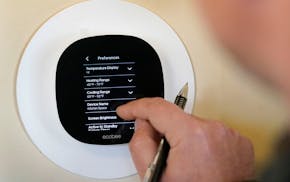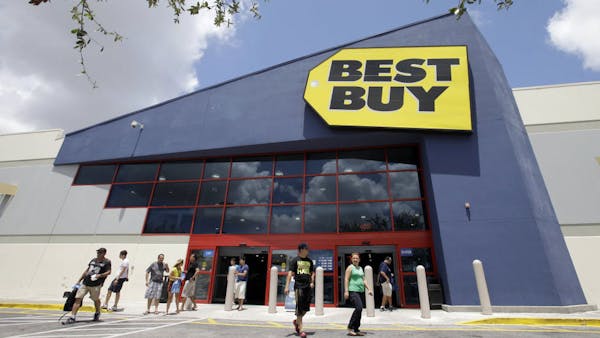Before responding with a French-accented staccato delivery about what's right for once-troubled Best Buy Co. Inc., CEO Hubert Joly paused strategically, then praised the reconciliation between the electronics giant and its former chairman and CEO, Dick Schulze.
"We were able to reunify the company with our founder," Joly said during a recent interview with the Star Tribune. "We are one Best Buy, all working together."
Indeed, a year ago at this time there was a lot not to like about Best Buy's prospects.
Joly was new on the job, untested in the bruising world of big retail. Best Buy's stock was in the tank; sales were languishing. And Schulze was on the prowl to buy the 47-year-old company and take it private.
But under Joly's stewardship, the 2012 holiday season marked a key turnaround for Best Buy. While overall sales were flat, they were better than expected. Domestic sales improved a tad; online sales increased; and core items like TVs, mobile phones, computers and appliances started to move again.
Cost reductions — which included 400 layoffs at corporate headquarters — and enhanced training for the sales force began to pay off.
A deal by Schulze to acquire the company never materialized, and Joly, who always kept an open-door relationship with the former chairman, welcomed the company's largest shareholder back into the Best Buy fold as chairman emeritus.
"One team, one dream," said Joly of the reconciliation.
In an interview last week after the company reported third-quarter earnings, Joly was upbeat compared with his remarks made a year earlier, when he characterized Best Buy's performance as "clearly unsatisfactory."
"We have made significant progress," said Joly, referring to Best Buy's "Renew Blue" turnaround strategy, punctuated by an emphasis to boost online sales, better use of showroom floor space and an enhanced customer experience.
"We are very pleased with the first year of the transformation, but the glass is half-empty," Joly added. "We will be on a multiyear journey."
One stock analyst likened Best Buy to a giant seafaring vessel.
"The tanker is still turning," said J.P. Morgan's Christopher Horvers in a report before the earnings announcement. "Successful turnarounds of market leaders tend to be long-tailed in nature. … The atrophy of Best Buy took three-plus years, so the turnaround could last just as long."
As Best Buy enters the critical holiday shopping season, costs are down, but sales aren't taking off. While customers seem happier with discounted prices, Best Buy's profit margins are being strained. And the competitive environment for the next six weeks will be dog-eat-dog.
"Our goal is to be the destination and authority for products and services," Joly said in remarks to Wall Street analysts.
Despite Best Buy's recent overtures to Wall Street — 17 of 28 analysts have a buy rating on the stock — unanswered questions still plague the company.
"What if Amazon continues to lower its prices?" asked Brian Yarbrough of Edward Jones & Co., referring to Best Buy's nettlesome online competitor. "There's a lot that is outside of their control. Can they cut costs out of the business without eventually affecting customer service? That makes me nervous."
But Yarbrough, who maintains a "neutral" rating on Best Buy, acknowledges that the company is in a stronger position today than it was a year ago.
"A year ago, the company was run very inefficiently. It wasn't price competitive," Yarbrough said in an interview. "They've stabilized the business. They closed underperforming stores. They've got $2 billion in cash. The question is, what is the long-term earnings power of this business?"
Best Buy stock closed Wednesday at $39.61. Although the stock took an 11 percent hit last week after third-quarter earnings were reported, it still is more than threefold above its low last December of $11.29.
"This is a war, not a battle," was the title of a research report from Credit Suisse analyst Gary Balter last week.
"Is there more to go? Absolutely," Balter said. "The top line is not there yet but the trend is moving in the right direction and management appears to be making the right moves to improve future results."
Joly agreed: "We're not saying this is over. We're just warming up."
In 2011, company executives, including then-CEO Brian Dunn, often used the term "economic headwinds" to describe Best Buy's languishing fortunes.
In a not-so-veiled shot at such sentiments, Joly told analysts: "A year or two ago, the message from this company was all about the headwinds to explain the results. We never talk about the headwinds. We are focused on the levers we can control."
David Phelps • 612-673-7269
Starbucks takes on the federal labor agency before the US Supreme Court
Stock market today: Wall Street poised to open with gains as corporate earnings reports pour in

